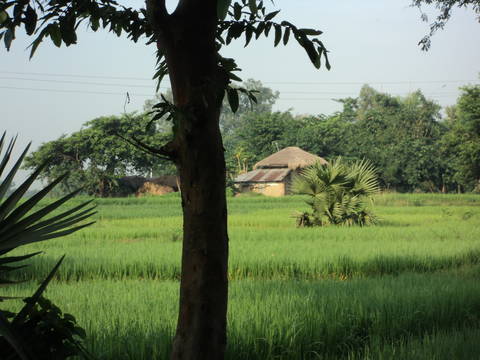The majority of India's populace - nearly 80% - lives in villages, yet the village population is both disadvantaged and neglected, as the economic dynamics and prosperity of recent years have bypassed India's rural communities. This is especially true of the indigenous population, the Adivasi.
Two Adivasi villages in West Bengal
Ghosaldanga and Bishnubati are two villages in the Indian Federal State of West Bengal, 150 Kilometers north-west of Kolkata (Calcutta). The town of Bolpur and the University of Santiniketan, which was founded by the Bengali poet Rabindranath Tagore, are about 10 Kilometers distant.
The villages are off the beaten track and can only be reached via dirt roads by ox carts, bicycles or motorbikes. It is only possible to get to Ghosaldanga by jeep in the dry season. There is no running water, nor is there a sewer system.
The inhabitants of these two villages belong to the Santal tribe, one of the largest of the indigenous ethnic groups (Adivasi) in India. Altogether about 900 people live in these villages; in Ghosaldanga about 45 families, in Bishnubati, 90. These people live as peasants in mud huts with roofs of rice straw or corrugated iron.
Holistic approach to development activities
In 1984, inspired and promoted by Dr. Martin Kämpchen, development activities commenced in the two villages with the aim of providing holistic support in all aspects of life, while keeping a balance between the conservation of Santal culture and the opening up of society, between economic progress and the sustainment of a valuable, natural way of life.

Education as the basis of development
The main approaches to village development and thus the main focus of work in this area are education and training. The Rolf-Schoembs-Vidyashram (RSV), a private elementary school up to year 4, takes account of the particular linguistic and cultural characteristics of Santal children.
From year 4 on, Santal children receive - in addition to their education at a state school - complementary support in "Coaching Centres". Children from difficult family backgrounds can be accommodated in a hostel.
Additional aspects of work focus
Numerous activities and projects are carried out in the field of medical care, ecological farming and culture. The culture of the Santal people is a lively one, frequently expressed through dance and song festivals. The first Santal museum has been erected in Bishnubati to ensure that the culture and history of the Santal people are never lost.



